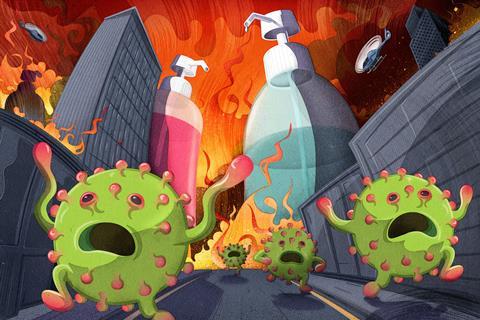Are quaternary ammonium compounds just as good at killing Covid-19 as alcohols?

During the Covid-19 pandemic we’ve learned more than we’d like about cleaning: how to clean your hands properly, for example, and which songs to sing while you do it. One message we’ve heard consistently is that when choosing a hand sanitiser, you need to pick one containing at least 60% alcohol. This advice comes from World Health Organization (WHO) standards based on the best scientific evidence available at the start of the pandemic. But now new research suggests that alcohol-free sanitisers containing other disinfectants may be just as effective against the virus. So is it time to rethink?
Supreme surfactants
Scientists recommend using 60% alcohol because it’s known to kill coronavirus. The alcohol molecules interfere with the ordered structure of the molecules in the virus’ fatty outer membrane or ‘envelope’, the result being that the virus collapses before infecting us. Chemicals such as benzalkonium chlorides, which are used in hospital disinfectants, shampoos, laundry softeners and pool cleaners, may work in a similar way by disturbing this outer membrane. Until now, though, scientists thought they worked too slowly to be practical.
A team led by Benjamin Ogilvie at Brigham Young University in Provo, Utah, showed that chemicals like benzalkonium chlorides, known as ‘quats’ – quaternary ammonium compounds made up of four alkyl or aryl groups linked by a nitrogen – can kill Covid-19 as quickly as alcohol can. Quats, like soaps, are surfactants, making them great cleaning products. In the first rapid-action tests of these chemicals, the team pitted coronavirus against 0.2% benzalkonium chloride and a hand sanitiser containing the chemical at 0.13%, along with two other quat-based cleaning products. All inactivated the virus in under 30 seconds.
Scientists recommend using 60% alcohol because it’s known to kill coronavirus. The alcohol molecules interfere with the ordered structure of the molecules in the virus’ fatty outer membrane or ‘envelope’, the result being that the virus collapses before infecting us. Chemicals such as benzalkonium chlorides, which are used in hospital disinfectants, shampoos, laundry softeners and pool cleaners, may work in a similar way by disturbing this outer membrane. Until now, though, scientists thought they worked too slowly to be practical.
Quaternary ammonium compounds can kill Covid-19 as quickly as alcohol can
A team led by Benjamin Ogilvie at Brigham Young University in Provo, Utah, showed that chemicals like benzalkonium chlorides, known as ‘quats’ – quaternary ammonium compounds made up of four alkyl or aryl groups linked by a nitrogen, can kill Covid-19 as quickly as alcohol can. Quats, like soaps, are surfactants, making them great cleaning products. In the first rapid-action tests of these chemicals, the team pitted coronavirus against 0.2% benzalkonium chloride and a hand sanitiser containing the chemical at 0.13%, along with two other quat-based cleaning products. All inactivated the virus in under 30 seconds.
A viable alternative?
However, we can’t simply update advice based on this new information. In the UK and Europe, changes to legislation in the last decade mean that benzalkonium chlorides and certain other quats are no longer used in hand sanitisers. (Although one, cocamidopropyl betaine (CAPB), is a very common ingredient in antimicrobial hand gels and foam sanitisers.) In the US, benzalkonium chlorides are still used in hand sanitisers – for now. A decision on their safety and effectiveness is pending while more studies are done.
Are there good reasons for using alcohol-free alternatives? Well, although they are classed as skin irritants, the companies that make them say their products are kinder to the skin than alcohols because they do not strip away oils – an improvement that would be appreciated by nurses and other key workers. There are also suggestions that quats may offer several hours more protection than alcohols do from certain microbes, although not specifically from coronavirus.
But there are some important downsides too. Most sewage treatment plants do not have the technology to remove quats from waste water, meaning they enter rivers and streams. While they are not considered toxic at low concentrations, they can damage cells and affect development in animals and so could be harmful to wildlife. Scientists need to keep an eye on levels to make sure they’re not rising, especially because they have also been linked to antibiotic resistance – bacteria that evolve under pressure from quats also seem to become more able to survive the drugs we use to treat disease.
So hold on to your hand sanitisers. With more questions that still need answering, we can’t yet make a straightforward switch.
Find out more about chemistry careers
Read about forensic toxicologist, Calum who ensures public safety through the testing of everyday items like food, cosmetics and medicines to ensure they are safe to use and consume.
Hayley Bennett









No comments yet